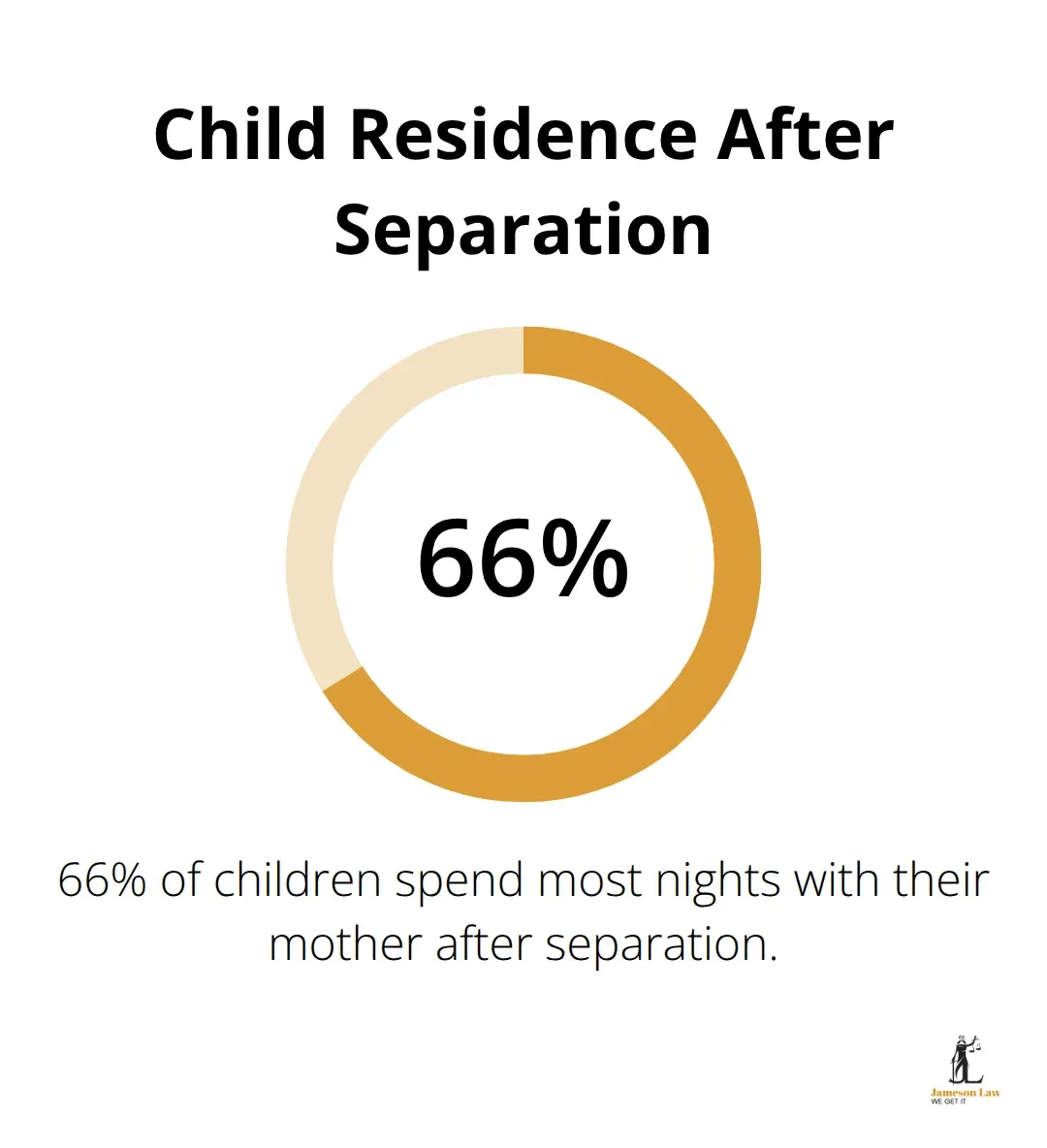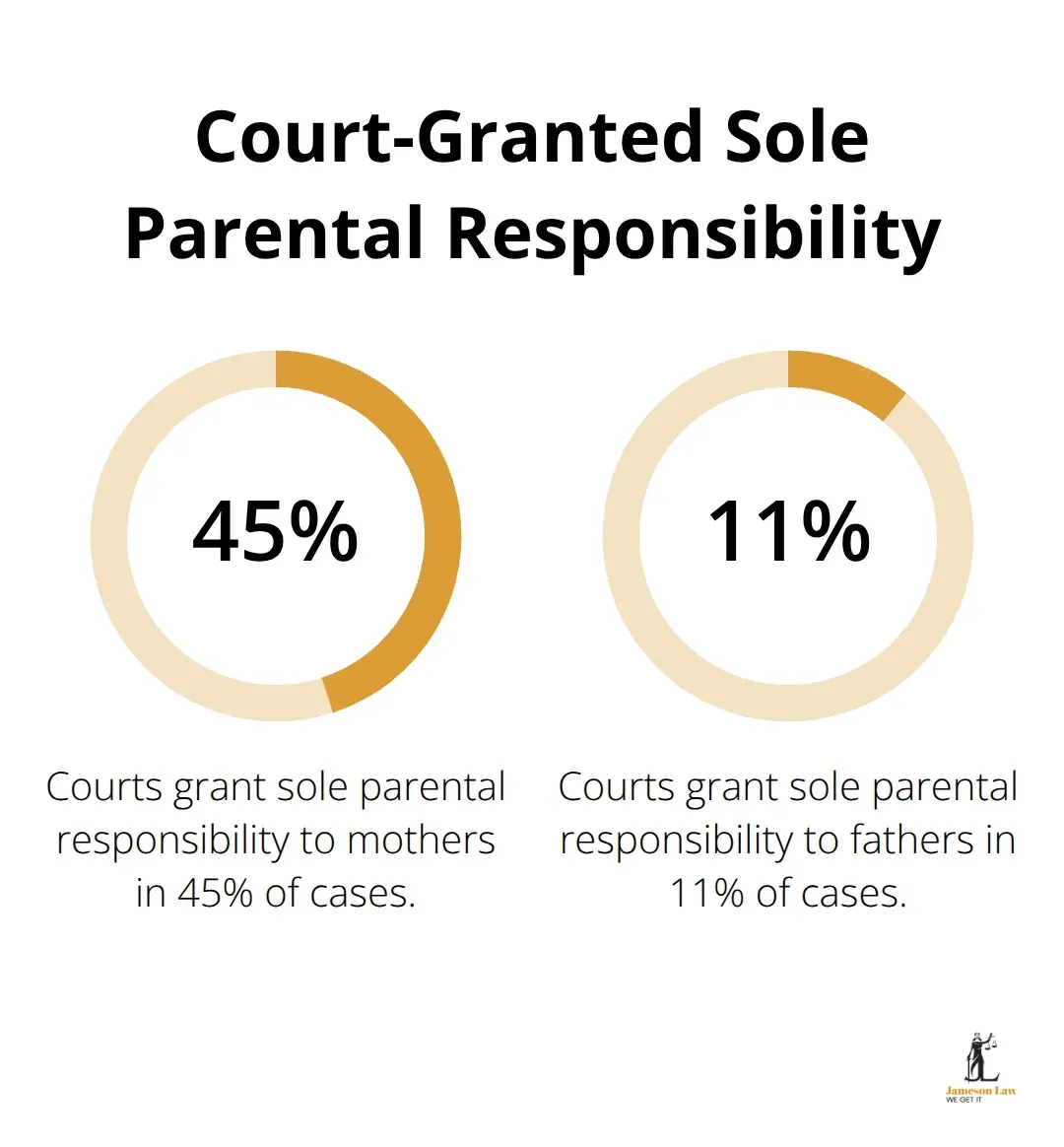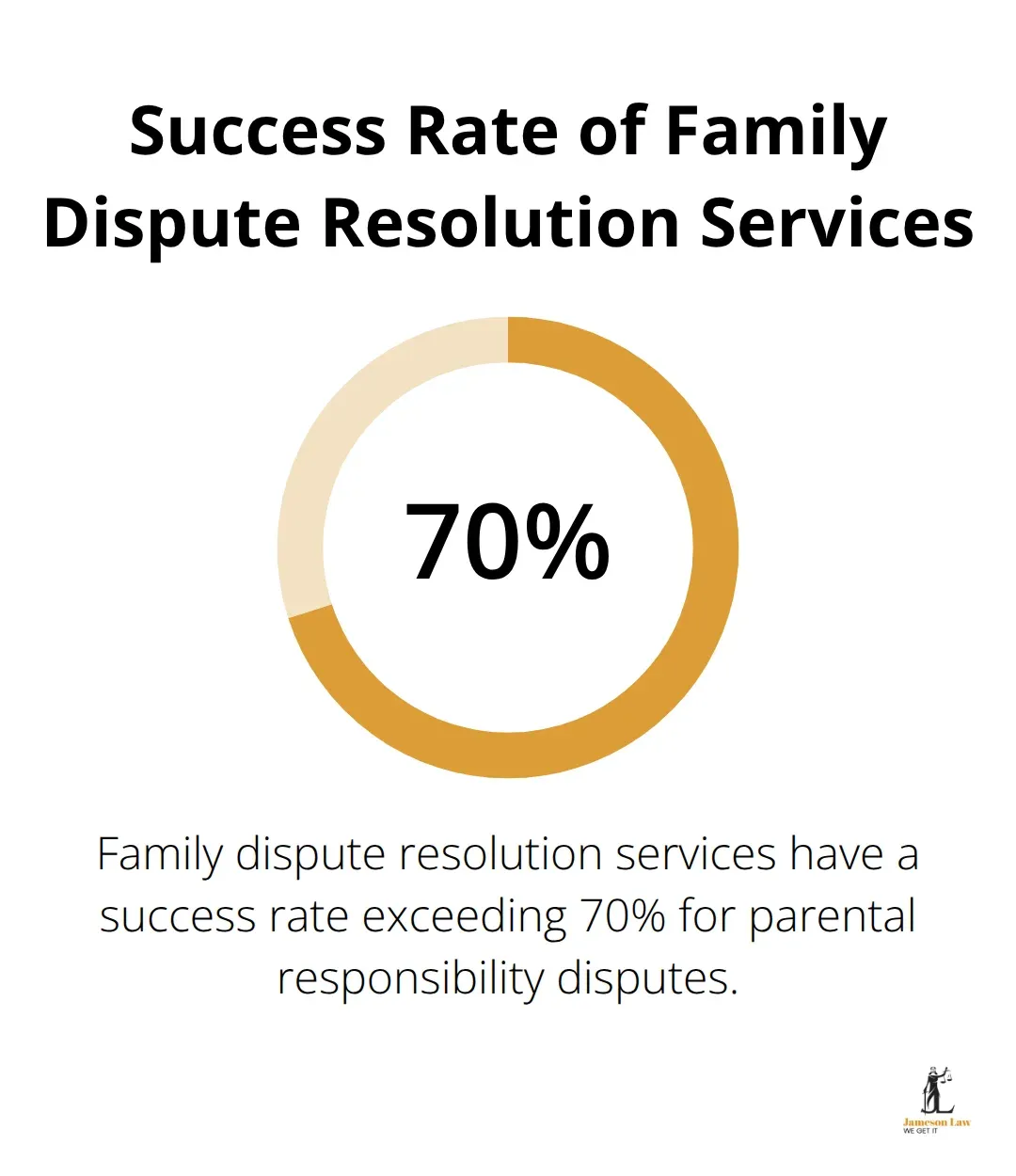Parental responsibility under the Family Law Act determines who makes major decisions about a child’s life after separation or divorce. This legal concept affects thousands of Australian families navigating custody arrangements each year.
We at Jameson Law see parents struggle with understanding their rights and obligations when relationships end. The distinction between parental responsibility and physical custody often creates confusion during already stressful times. Our Sydney team helps parents across NSW understand their options and make informed decisions.
What Does Parental Responsibility Actually Cover
Section 61B of the Family Law Act 1975 defines parental responsibility as all duties, powers, responsibilities, and authority parents have over their children. This legal framework grants parents the right to make major long-term decisions about education, health care, religious upbringing, name changes, and residence arrangements that significantly affect the child’s time with each parent. Both separated parents automatically retain this responsibility until their child turns 18, regardless of their relationship status or current residence arrangements.
The Reality Behind Joint Decision-Making
Australian Institute of Family Studies data shows that 66% of children spend most nights with their mother after separation, yet both parents typically maintain equal decision-making rights. This creates practical challenges when parents disagree about school choice or medical treatment. Parents must genuinely consult each other and attempt to reach joint decisions on major issues, even when they live in different cities or have contentious relationships. Day-to-day decisions like clothing choices, meal plans, and bedtime routines fall outside parental responsibility requirements. Practical tools and services for separated parents are available via Family Relationships Online and the Raising Children Network.

Why Parental Responsibility Differs From Physical Care
Courts grant sole parental responsibility to mothers in 45% of cases and fathers in only 11% of cases, but these statistics don’t reflect physical custody arrangements. A parent can have sole parental responsibility while the child lives primarily with the other parent, or parents can share decision-making responsibility while they maintain unequal time arrangements. This separation between decision-making authority and physical care means that non-residential parents often retain significant input into their child’s upbringing (creating ongoing obligations and rights that many parents underestimate during separation negotiations). For parenting pathways and court information, see the Federal Circuit and Family Court of Australia.
When Courts Modify Parental Responsibility
Courts may transfer or modify parental responsibility in specific circumstances, such as death, abandonment, or incapacity of a parent. Alternative caregivers like grandparents or foster parents can apply for parental responsibility if they demonstrate concern for the child’s care, welfare, or development. The court’s primary consideration remains the best interests of the child when altering these responsibilities. Guidance and support services are available through LawAccess NSW and Services Australia Child Support.
How Courts Determine Parental Responsibility
Courts apply a strict framework when they determine parental responsibility arrangements, with the child’s best interests as the overriding principle. Australian Institute of Family Studies research presents qualitative data from focus groups examining parent-child contact arrangements. Courts consider specific factors including the child’s safety from physical and psychological harm, their expressed views when developmentally appropriate, and the benefit of maintaining meaningful relationships with both parents. Courts also evaluate each parent’s capacity to provide for the child’s physical and emotional needs, their willingness to facilitate the child’s relationship with the other parent, and any history of family violence or substance abuse.
Evidence That Shapes Court Decisions
Family courts require concrete evidence to support parental responsibility claims, not emotional arguments or personal opinions. Documentation that proves effective communication between parents carries significant weight, as does evidence of genuine consultation attempts on major decisions. Courts scrutinise school reports, medical records, and expert assessments to evaluate each parent’s involvement in the child’s life. Parents who demonstrate flexibility in arrangements and avoid alienation behaviours toward the other parent receive favourable consideration. Conversely, documented patterns of withholding information, making unilateral decisions, or displaying hostility toward co-parenting efforts severely damage parental responsibility claims. Parents can verify clinician credentials via the AHPRA register.

Practical Factors Courts Examine
Judges focus heavily on practical considerations rather than theoretical parenting capacity when they make determinations. Distance between parents’ homes, transportation costs, and work schedules directly impact court decisions about shared responsibility arrangements. The Act requires parents to consult and endeavour to agree where there is shared parenting responsibility on major issues affecting a child. Courts examine whether parents can genuinely consult each other despite geographical or relationship challenges, with evidence of successful collaboration on past decisions that strengthen cases. The assessment process typically involves family reports, independent children’s lawyers for complex cases, and sometimes psychological evaluations to determine the most suitable arrangement. For NSW education information and school comparisons, see NESA and My School.
When Parents Face Ongoing Disputes
Courts recognise that even well-intentioned parents may struggle with major decisions after separation, particularly when they disagree about fundamental aspects of their child’s upbringing. Recent changes to the Family Law Act include new laws about how Courts will make parenting orders in the best interests of a child, removing the presumption of equal shared parental responsibility. Courts now evaluate each family’s unique circumstances rather than apply blanket rules. These disputes often centre on specific areas where parental values clash most dramatically, such as education choices, medical treatments, and religious practices. Helpful references include the Australian Immunisation Handbook and online safety guidance from the eSafety Commissioner.
Common Parental Responsibility Disputes and Resolutions
Medical and educational decisions create the most heated parental responsibility disputes, particularly when parents hold fundamentally different views about their child’s welfare. Emergency medical situations highlight these tensions when one parent opposes necessary treatment or insists on alternative therapies against medical advice. School choice disputes often involve private versus public education, with parents who disagree about religious instruction, academic programs, or special needs support. Courts consistently favour evidence-based decision processes, which means parents who present medical expert opinions or educational assessments typically prevail over those who rely on personal beliefs or financial convenience. Community resources include Multicultural NSW and AIATSIS for cultural connections.
Religious and Cultural Decision Conflicts
Parents from different cultural backgrounds frequently clash over their child’s religious upbringing, language education, and cultural practices. Courts recognise that children benefit from exposure to both parents’ heritage, but they prioritise arrangements that avoid confusion or conflict for the child. Indigenous families face additional complexity as courts must consider the child’s right to maintain connection with their Aboriginal or Torres Strait Islander culture. Documentation of past cultural participation, language skills, and community connections strengthens parental responsibility claims significantly more than theoretical arguments about cultural importance (particularly when parents can demonstrate active involvement in cultural activities).
Interstate Relocation Battles
Relocation disputes represent the most complex parental responsibility challenges, with courts that examine practical factors like employment opportunities, extended family support, and educational advantages. Parents who seek relocation must demonstrate genuine reasons beyond escape from the other parent, while parents who oppose must prove the move harms the child’s best interests rather than their own convenience. Currently, all non-resident parents are expected to pay at least $260 per year in child support, with courts that require detailed proposals about maintenance of the child’s relationship with the non-relocating parent through technology, travel arrangements, and holiday schedules. Payment information and calculators are at Services Australia Child Support.
Resolution Through Mediation and Court Orders
Family dispute resolution services help parents resolve conflicts before they reach court, with success rates that exceed 70% for parental responsibility disputes. Mediation allows parents to explore creative solutions that courts might not consider, such as alternating decision authority for different areas or specialist consultation requirements. When mediation fails, courts issue specific orders that outline each parent’s decision authority and consultation obligations (which reduces future conflicts by providing clear guidelines for major decisions). You can locate a practitioner through Family Relationships Online.

Final Thoughts
Parental responsibility under the Family Law Act creates ongoing obligations that extend far beyond physical custody arrangements. Parents retain decision-making authority for major long-term issues regardless of where their children live. Courts prioritise the child’s best interests over parental convenience when they evaluate these complex family situations.
Early legal intervention prevents costly disputes and protects your parental rights during separation proceedings. Complex cases that involve interstate relocation, cultural conflicts, or medical disagreements require specialist knowledge of recent legislative changes and court precedents. Documentation of genuine consultation attempts and evidence-based decision making significantly strengthens your position in parental responsibility disputes.
We at Jameson Law provide expert family law guidance across NSW and help parents navigate parental responsibility arrangements. Our team understands the practical challenges of co-parenting after separation and works to achieve outcomes that serve your children’s best interests while protecting your parental rights. Call (02) 8806 0866 or reach us via our contact page to discuss your situation in Sydney or anywhere in NSW.













